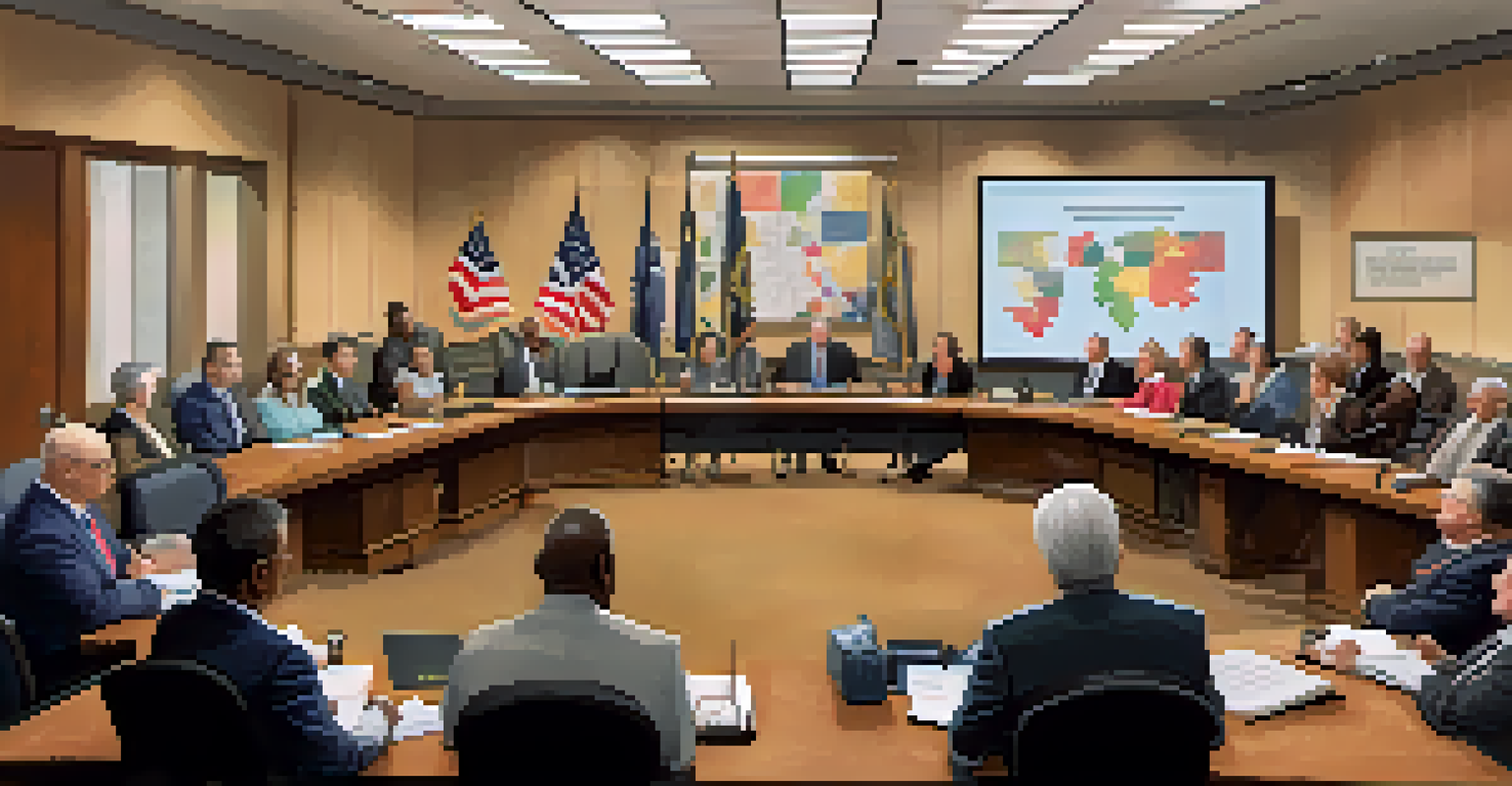Local Government in Tennessee: Structure and Function

An Overview of Local Government in Tennessee
Local government in Tennessee plays a crucial role in the daily lives of its citizens. It encompasses various entities like counties, cities, and towns, each with its own responsibilities. This structure allows for localized decision-making, ensuring that community needs are met effectively. Understanding this framework is essential for engaging with civic matters and public services.
Local government is the closest layer of governance to the people.
Tennessee's local governments operate under the authority granted by the state constitution and statutes. This means they have specific powers and responsibilities defined by state law. For instance, they manage essential services such as public safety, infrastructure, and local education. Knowing who does what can help residents navigate these services more easily.
In essence, local government is the closest layer of governance to the people. It addresses issues that matter most to residents, such as zoning laws, waste management, and public transportation. By engaging with local officials, citizens can influence decisions that directly affect their communities.
The Structure of Local Government: Counties and Cities
Tennessee's local government is primarily divided into two main categories: counties and cities. There are 95 counties in the state, each governed by an elected county commission. These commissions make decisions on budgets, taxes, and local ordinances, playing a pivotal role in county governance.

Cities in Tennessee can be classified as either 'chartered' or 'non-chartered.' Chartered cities have their own charters, which outline their governance structure and powers. Non-chartered cities follow general laws that apply to all municipalities in the state. This distinction impacts how local laws are created and enforced.
Local Government's Role in Tennessee
Local government is essential for addressing community needs and providing services like public safety and education.
Understanding the differences between counties and cities is essential for grasping local governance. Each has unique responsibilities and processes that affect how services are delivered and how community issues are addressed. This structure ensures that local governments can respond effectively to the needs of their populations.
Roles and Responsibilities of County Governments
County governments in Tennessee serve as the primary administrative unit for local services. They are responsible for a wide array of functions, including law enforcement, public health, and infrastructure maintenance. This broad mandate allows counties to cater to the diverse needs of their residents.
Elections are a fundamental aspect of local government, allowing citizens to choose their representatives.
Each county has elected officials such as the county mayor, sheriff, and assessor of property. These officials manage their respective departments and ensure that services are delivered efficiently. For example, the sheriff oversees law enforcement, while the mayor handles county operations and budgeting.
The county commission plays a vital role in overseeing these officials and approving budgets. They meet regularly to discuss county matters, allowing for community input and participation. This structure fosters transparency and accountability within local government.
City Governments: Structure and Leadership
City governments in Tennessee are typically led by a mayor and a city council. The mayor acts as the executive officer, while the council serves as the legislative body. This separation of powers helps balance decision-making and community representation.
City councils are composed of elected representatives who advocate for their constituents' interests. They pass local ordinances, approve budgets, and oversee city departments, ensuring that the city runs smoothly. This local governance model empowers citizens to have a say in the issues that matter most to them.
Structure of Counties and Cities
Tennessee's local government is divided into counties and cities, each with unique responsibilities and governance structures.
In addition to the mayor and council, many cities have specialized departments, such as public works and parks and recreation. These departments are responsible for maintaining city services and improving the quality of life for residents. Understanding this structure helps citizens engage more effectively with their local government.
Local Government Services: What They Provide
Local governments in Tennessee are responsible for a wide range of essential services. These include public safety, education, infrastructure, and community development. By managing these services, local governments ensure that communities function effectively and residents have access to necessary resources.
For example, local police and fire departments provide public safety services, while school boards manage education systems. Public works departments handle road maintenance and waste management, contributing to a clean and safe environment. These services are critical for maintaining the overall well-being of the community.
Residents can often directly engage with these services through community programs, town hall meetings, and public hearings. This engagement fosters a sense of ownership and responsibility among citizens, encouraging them to participate actively in local governance.
Elections and Citizen Participation in Local Government
Elections are a fundamental aspect of local government in Tennessee, allowing citizens to choose their representatives. Local elections occur every four years for positions like mayors, council members, and county commissioners. This regular cycle ensures that local leaders remain accountable to their constituents.
Citizen participation extends beyond voting; it includes attending local meetings, joining advisory boards, and engaging in community initiatives. These activities provide residents with opportunities to voice their opinions and influence local policies. Engaging in the democratic process is vital for a healthy local government.
Challenges for Local Governments
Local governments face challenges such as budget constraints and demographic changes, requiring innovative solutions and community engagement.
Moreover, community involvement helps bridge gaps between local officials and residents. When citizens actively participate, they can foster transparency and responsiveness in government actions. This collaboration ultimately leads to a stronger, more vibrant community.
Challenges Facing Local Governments in Tennessee
Local governments in Tennessee face various challenges, including budget constraints and population changes. Economic fluctuations can impact funding for essential services, making it crucial for local leaders to prioritize effectively. Balancing community needs with available resources is an ongoing struggle.
Additionally, demographic shifts can create new challenges for local governments. As populations grow or decline, local officials must adapt to changing needs, such as housing, transportation, and public services. This adaptability is key to maintaining a high quality of life for residents.

Ultimately, addressing these challenges requires innovative solutions and community engagement. Local governments must collaborate with citizens, businesses, and other stakeholders to find effective ways to navigate these complex issues. By working together, they can create sustainable and resilient communities.